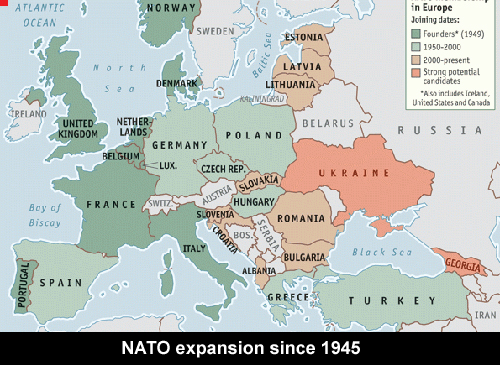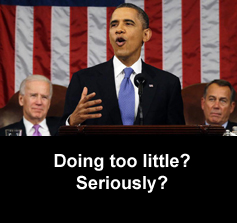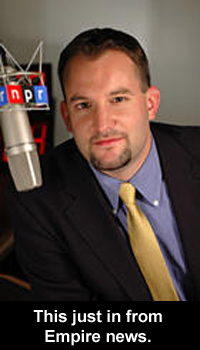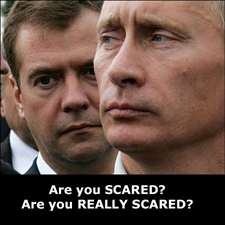The onslaught continues, in more ways than one. Putin’s wholly unjustified invasion of Ukraine is entering its third week with no end in sight. At the same time, the corporate media is propagandizing the living hell out of the conflict, platforming rhetoric that could lead to World War III. Nothing less than that.
The Biden Administration has thus far remained cautious with regard to involving the U.S. or NATO directly in Ukraine. They deserve some credit for that, though I’m not sure what the appropriate prize is for NOT burning down the house. Of course, the neocon wing of the Republican party and the various networks are pushing hard to get Biden to agree to some crazy shit. I guess I shouldn’t be surprised at how irresponsible they’re being, but it is kind of shocking.
Preaching to the choir
I can’t remember a time when the media worked so hard to convince the American people to support something they already agree with. Their coverage of Ukraine is wall-to-wall, and there’s a meme-like repetitiveness to the content they’re pushing out. I have seen that little boy crying while he’s walking up the street so many times. Then there’s the armed men in the balaclavas who talk about revenge on the Russians and demand a no-fly zone.
I’m not denying the authenticity or even the heartrending nature of some of these clips. But their repetition seems to have a point – we should be doing more. And when the corporate media talks about doing more, it’s always in the context of a conversation with a general. They have been entranced with the U.S. military since the Gulf War, and the national security state is their go-to source on how to end a conflict.
There’s a reason why a majority of Americans support a no-fly zone in Ukraine: they hear it talked about incessantly on T.V. Even when the commentators say it’s a bad idea, the conversation continues as if there’s some controversy.
The planes, boss, the planes
Then there’s the debate over delivering fighter planes to the Ukrainians. Someone cooked up a plan to have Poland give them 26 old MIGs in return for new planes from the United States. The Poles reasonably considered this a bad idea, as it would make it seem as though they were directly involved in the conflict. Then they doubled back and suggested the United States do the transfer via a base in Germany. Not so good.
This story has been hashed over by the press almost incessantly. Very few, however, have questioned the utility of this effort on Ukraine’s behalf. Where would they base these planes, or keep the Russians from bombing them to bits on the first day? How would these 40-year-old MIGs fare against a far larger, modern Russian air force? This is totally beside the fact that such an obvious move would be tantamount to joining the fight in earnest. And yet, the conversation continues, in part because the Ukrainians want the planes, like they want the no-fly zone.
Backing away from the brink
It is incumbent upon those of us who are still sane to encourage the administration and the political class more generally not to make the mistake of becoming a combatant in this war. While many have seemingly forgotten that we are living on a nuclear powder keg, the rest of us need to encourage our fellow Americans not to play with matches.
This is not 1939, folks, Churchill allusions notwithstanding. There were no nukes in 1939. Russia is not prewar Germany, which was the world’s greatest industrial and military power at the time. This is more like 2003, when a rogue superpower decided to defy the world and invade another country for no good reason. There can be no Russo-American war – not now, not ever. Not if the world is to survive. It’s that simple.
luv u,
jp



 Then there’s “Morning Joe” (or “Morning Blow”) on purportedly liberal/progressive MSNBC. Their foreign policy braintrust of, well, Joe Scarborough, Richard Haas, and various senior editors from Politico have been engaging in a narrative that goes something like this, in short – “W” Bush did too much, Obama does too little, and both put us in greater danger from the scourge of jihadist terrorism, which has killed nearly one person in the United States so far this year (call it none). Setting aside the obsessive focus on this rare and sensational threat, I agree with the assertion that both presidents’ foreign policies have put us in greater danger, breeding a new generation extremists, several of whom, for instance, attacked the offices of Charlie Ebdo in Paris. But the notion that Obama does too little is ludicrous. Bush and Obama basically have the same foreign policy. Obama is following Bush’s playbook from 2006-08. And yes, it is murderous and destabilizing and designed to radicalize people.
Then there’s “Morning Joe” (or “Morning Blow”) on purportedly liberal/progressive MSNBC. Their foreign policy braintrust of, well, Joe Scarborough, Richard Haas, and various senior editors from Politico have been engaging in a narrative that goes something like this, in short – “W” Bush did too much, Obama does too little, and both put us in greater danger from the scourge of jihadist terrorism, which has killed nearly one person in the United States so far this year (call it none). Setting aside the obsessive focus on this rare and sensational threat, I agree with the assertion that both presidents’ foreign policies have put us in greater danger, breeding a new generation extremists, several of whom, for instance, attacked the offices of Charlie Ebdo in Paris. But the notion that Obama does too little is ludicrous. Bush and Obama basically have the same foreign policy. Obama is following Bush’s playbook from 2006-08. And yes, it is murderous and destabilizing and designed to radicalize people.
 Right, well … I was never a big fan of Dave’s, but you get the idea. Part of the problem with our once-over-lightly media culture is that there is an extraordinarily rapid resort to black-and-white, wrong vs. right narratives that are easy to report, easy to digest, easy to repeat again and again. In all that, we lose the sense that it’s possible to have two assholes in a fight – adversaries who are divided by conflicting claims, not by a contrast between absolute good and absolute evil.
Right, well … I was never a big fan of Dave’s, but you get the idea. Part of the problem with our once-over-lightly media culture is that there is an extraordinarily rapid resort to black-and-white, wrong vs. right narratives that are easy to report, easy to digest, easy to repeat again and again. In all that, we lose the sense that it’s possible to have two assholes in a fight – adversaries who are divided by conflicting claims, not by a contrast between absolute good and absolute evil.